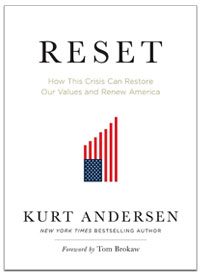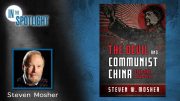
Do you think that our present economic crisis is a great thing? Do you view the fears of Americans for their job prospects and their ability to keep paying their mortgage as a golden opportunity to remake the world according to the pattern of your ideology? Do you look back with nostalgia to the good old days of Jimmy Carter? Then Kurt Andersen’s new book, Reset — How This Crisis Can Restore Our Values and Renew America is the book for you.
On a surface level, a reader could be deceived by the title of the book; one might reasonably expect such a title to introduce a book about restoring constitutional checks and balances in government, sound monetary policy, and possibly some good old-fashioned decency and moral responsibility. But then, that book might not boast a Foreword by Tom Brokaw. By the time one has read the first few pages, it becomes very clear that Andersen’s reset button is set to a period lasting from the glories of FDR’s Work Projects Administration and Civilian Conservation Corps up through 1982, and that pushing this “reset” is more likely to “crash” the system than it is to “reboot” it. But a more accurate title might have been Putsch — You’ve Got to Break a Few Eggs to Make an Omelette. Another more suitable title, How I Came to Love the Bombed Economy, might not have the “warm and fuzzy” spin on advancing a “Socialism-lite” agenda for which the author seems to have been aiming.
Brokaw sounds the theme in his mercifully brief Foreword (its six short paragraphs do not even allow time for a knee-jerk appeal to the “Greatest Generation”). Still, there is space for the punchline for the entire book: “The new American economic culture should be about proportion and function, efficiency and accessibility.” (xii) All that claptrap about the freedom to pursue one’s happiness, the virtues of free enterprise, and building the best life possible for your family will be swept away by the Revolution of “Change We Will Be Compelled to Believe In.”™ As a matter of fact, Brokaw isn’t sure you should really have your own home: “Does everyone really qualify as a home buyer, or is it more realistic to admit that some are destined to rent? In this era of energy concerns, isn’t it more sensible to build more efficient common-wall houses in larger green spaces than more McMansions on tiny lots?” (xii-emph. added)
Go for it, Tom! In fact, why wimp out with such a modest agenda? Wouldn’t it be far more efficient for those destined to be members of the plebeian masses to simply live in barracks, where they can be fed a diet which is better for them than they would choose on their own, and clothed more efficiently in delightful little uniforms? (Perhaps we can get one of President Obama’s legion of czars working on this…) Brokaw invokes the opinion of “a friend” to establish the mindset of this glorious new era: “A friend … suggests that America adopt a new mantra as it emerges from this hangover brought on by reckless excess. ‘We should get up every morning and ask, “What do I need?” Not “What do I want?”’” Absolutely! Americans should embrace a future where they ask, “How can I eke out enough for my family to survive?,” rather than wallowing in dreams of conveniences that they are not destined to actually possess. Still, as mantras go (the Hindu spin certainly adds a lot to the whole argument), the image of people wandering around muttering, “What do I need? What do I need?” may not be the telegenic moment Tom’s looking for; perhaps more of a Wizard of Oz-angle would work? We could slap our little red, government-issued slippers together and chant, “There’s no place like Pyongyang! There’s no place like Pyongyang!”
Andersen appears to embrace Brokaw’s barracks-of-destiny: “Urban planning can be our friend, if we acquire the political will to use it. ‘The days where we’re just building sprawl forever,’ President Obama said recently at a town hall meeting in south Florida, ‘those days are over. I think that Republicans, Democrats — everybody recognizes that that’s not a smart way to design communities.” And “smart” now can be imposed without concern for the silly sentimentalities of particular communities or the dreams of the plebeian masses.
“Destiny” is the unifying theme of Reset. The author serves up a few scraps of old-time Marxist historical dialectic as he tells us in terms befitting an infantile Hegel armed with a new box of crayons: “In politics and life, babies do occasionally get thrown out with the bathwater, as we just discovered to be the case with the deregulatory frenzy unleashed in the 1980s. But the next new America that’s about to hatch will not be some Bizarro World, where we do the opposite of everything we did during the last quarter century. History proceeds dialectically: that is, Big Idea Y eclipses Big Idea X, but only for a while, until an X+Y hybrid arises, and so on, back and forth, over and over.”
And as good dialectical materialists, we know “you can’t fight the forces of history.” But just in case anyone does try to resist “Change We Can Impose,”™ Andersen tells us of the imposition of our green future: “We can make fossil fuels expensive enough so that solar and wind become more economical, and at the same time commit seriously to green nuclear power.” What constitutes “green” nuclear power is undefined, but it is not hard to understand what making “fossil fuels expensive enough” means — it means “Cap and Trade” is only the beginning of carbon taxation. How would you like another $10 a gallon in taxes at the pump? After all, the Leader has determined it is for your good in the brave new world of Big Idea Y.
Andersen urges us to embrace the darkness of the age: “But these times are not just accursed, not simply an awful episode to be endured — they really are interesting times, because of the new and possibly improved America that might be created out of the wreckage. Last fall, the unthinkable became thinkable and then, in the matter of a few weeks, actual. A signature phrase of the decade, ‘shock and awe,’ suddenly had an additional, domestic meaning.” The breathtaking stupidity of such a statement leaves the mind reeling; does he really want to compare the election of Obama to the bombing of Baghdad? Does he really want to blast the American people into stunned acceptance of the new order that he and his comrades will impose with what used to be called a Blitzkrieg?
While Americans struggle out of the economic rubble of Obama’s “bunker busters,” Andersen tells us that the moment has come for the Revolution. “With the Soviet Union gone and China socialist in name only [!], the specter of communism is no longer haunting us, so programmatic whiff of ‘socialism’ are not remotely as toxic politically as they used to be.” In other words, the man-on-the-street no longer reflexively reaches for the tar and feathers when some folks appear to favor the “Internationale” as the new “Battle Hymn of the Republic.”
Andersen continues: “Republicans have been getting little political traction with their insistence, before and after the election, that Obama is a socialist. That bogeyman pretty much wore itself out at the end of the last century, and these days reliably frightens only people desperate for simple black-and-white understandings of the way the world works. Rather it’s now capitalist piggishness more than collectivism that provokes genuine and widespread fear and loathing.” So … tens of millions of people were slaughtered in camps by bogeymen? The military might of an armed doctrine crushing nation after nation under its totalitarian boots for decades was all just the work of a bogeyman? It would appear that what Andersen is counting on is the historical amnesia of the American people. Black and white thinking, after all, is for people who believe in an objective ethical standards, an unchanging standard of Truth, and an undying belief that the U.S. Constitution is not a wax nose for radicals to shape according to their whims.
Meanwhile, the collectivist drive of the Obama administration appears to be waking people up with a speed that is alarming to the revolutionaries in Washington. Runaway deficits, the swelling ranks of the unemployed, mad schemes to collectivize healthcare, and loopy environmental schemes to tax American industry into the glory days of the 17th century threaten our nation, while the president and his teleprompter think that simply regurgitating the campaign slogans of last year while bend the people to his will. “Shock and awe” economics may not be quite the force of a historical dialectic that Andersen imagines it will be.
Kurt Andersen, Reset — How This Crisis Can Restore Our Values and Renew America (New York: Random House, 2009), hardcover, 74 pages, $15.00



